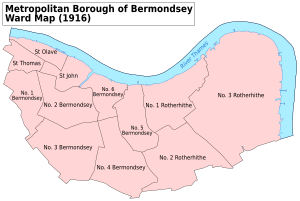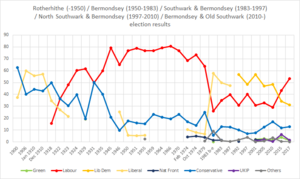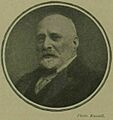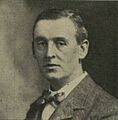Bermondsey (UK Parliament constituency) facts for kids
Quick facts for kids {{{Name}}}[[{{{Type}}} constituency]] |
|
|---|---|
| [[Image:{{{Map1}}}Constituency.svg|120px|]] [[Image:England{{{Map2}}}.svg|120px|]] |
|
| {{{Name}}} shown within [[{{{Entity}}}]], and {{{Entity}}} shown within England | |
| Created: | {{{Year}}} |
| MP: | {{{MP}}} |
| Party: | {{{Party}}} |
| Type: | House of Commons |
| County: | [[{{{County}}}]] |
| EP constituency: | [[{{{EP}}} (European Parliament constituency)|{{{EP}}}]] |
Bermondsey was a special area in South London, England, that elected one person to represent it in the UK Parliament. This elected person is called a Member of Parliament (MP). The way they voted was called "first-past-the-post." This means the candidate with the most votes wins, even if they don't get more than half of all the votes.
The Bermondsey area was first set up to elect an MP for the 1885 election. It stopped being a separate area for the 1918 election. Most of its land then became part of two new areas: Bermondsey West and Rotherhithe.
Later, a new Bermondsey area was created for the 1950 election. This new area also included Rotherhithe. It was then stopped for the 1983 election. After that, a new area called Southwark and Bermondsey took its place.
Contents
History of Elections
The 1983 by-election was a very tough and talked-about election. It happened when the old MP, Bob Mellish, stepped down. The election was won by Simon Hughes from the Liberal Party. This was a big change because Bermondsey had usually voted for the Labour Party.
What Were the Boundaries?
The "boundaries" of a constituency are like its borders. They show exactly which streets and neighborhoods are included in that area for voting.
Boundaries from 1950 to 1974
During these years, the Bermondsey voting area was the same as the old Metropolitan Borough of Bermondsey.
Boundaries from 1974 to 1983
From 1974 to 1983, the Bermondsey voting area included specific parts (called wards) of the London Borough of Southwark. These wards were Abbey, Bricklayers, Browning, Cathedral, Chaucer, Dockyard, Riverside, and Rotherhithe.
Members of Parliament (MPs)
The people listed below were the MPs who represented Bermondsey in the UK Parliament during different times.
MPs from 1885 to 1918
| Election | Member | Party | |
|---|---|---|---|
| 1885 | Thorold Rogers | Liberal | |
| 1886 | Alfred Lafone | Conservative | |
| 1892 | Reuben Barrow | Liberal | |
| 1895 | Alfred Lafone | Conservative | |
| 1900 | Henry Cust | ||
| 1906 | George Cooper | Liberal | |
| 1909 by-election | John Dumphreys | Conservative | |
| 1910 | Harold Glanville | Liberal | |
| 1918 | The Bermondsey area was stopped. See Rotherhithe and Bermondsey West instead. | ||
MPs from 1950 to 1983
| Election | Member | Party | Notes | |
|---|---|---|---|---|
| 1950 | Bob Mellish | Labour | He was a very important Labour Party leader from 1969 to 1976. He left Parliament in November 1982. | |
| 1983 by-election | Simon Hughes | Liberal | ||
| 1983 | The Bermondsey area was stopped. See Southwark and Bermondsey instead. | |||
Election Results Overview
Elections show how many people voted for each candidate and party. The results help us understand how popular different parties were in Bermondsey over the years.
The detailed results for each election show who won, by how many votes, and how many people voted in total. Bermondsey was often a strong area for the Labour Party, but sometimes other parties won, like the Liberal Party in the 1983 by-election.
Images for kids
Sources
- Richard Kimber's Political Science Resources: UK General Elections since 1832
 | Aaron Henry |
 | T. R. M. Howard |
 | Jesse Jackson |






